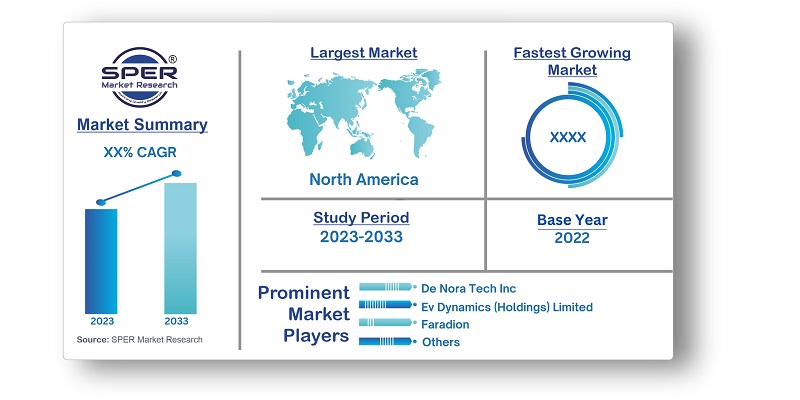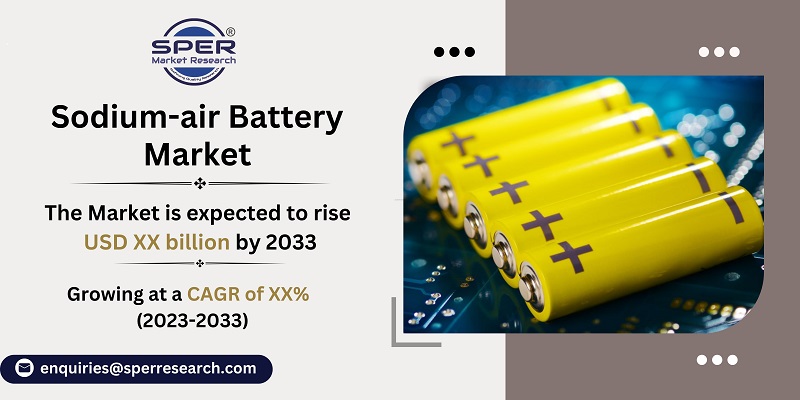
Sodium-air Battery Market Growth, Size, Trends, Demand, Revenue, Challenges and Future Outlook
Sodium-air Battery Market Size- By Electrolyte, By End User- Regional Outlook, Competitive Strategies and Segment Forecast to 2033
| Published: Oct-2023 | Report ID: CHEM2393 | Pages: 1 - 224 | Formats*: |
| Category : Chemical & Materials | |||
- April 2022: To address the intricate and expanding needs of the EV market, AMTE Power plc collaborated with Eltrium, a producer of energy storage systems, and Sprint Power, an engineering and technology firm, to provide next-generation battery solutions.
- March 2021: The sodium-ion battery technology business Faradion and AMTE Power plc worked together to integrate the latter's intellectual property with AMTE Power's design and production skills.


| Report Metric | Details |
| Market size available for years | 2019-2033 |
| Base year considered | 2022 |
| Forecast period | 2023-2033 |
| Segments covered | By Electrolyte, By End User |
| Regions covered | North America, Asia-Pacific, Latin America, Middle East & Africa and Europe |
| Companies Covered | De Nora Tech Inc., Ev Dynamics (Holdings) Limited, Faradion, Fuji Pigment Co., Ltd., Natron Energy, Phinergy, PolyPlus, Xinjiang Joinworld Co., Ltd., Others |
- Electric Vehicle Manufacturers
- Electricity Consumers
- Government Agencies and Policymakers
- Industrial and Manufacturing Sectors
- Investors and Venture Capitalists
- Remote and Off-Grid Communities
- Renewable Energy Industry
- Researchers and Academia
- Utilities and Grid Operators
- Others
| By Electrolyte: |
|
| By End User: |
|
| By Region: |
|
- Global Sodium-air Battery Market Size (FY’2023-FY’2033)
- Overview of Global Sodium-air Battery Market
- Segmentation of Global Sodium-air Battery Market By Electrolyte (Aqueous, Non-aqueous)
- Segmentation of Global Sodium-air Battery Market By End User (Automotive, Consumer Electronics, Defense, Power, Utility Energy Storage, Others)
- Statistical Snap of Global Sodium-air Battery Market
- Expansion Analysis of Global Sodium-air Battery Market
- Problems and Obstacles in Global Sodium-air Battery Market
- Competitive Landscape in the Global Sodium-air Battery Market
- Impact of COVID-19 and Demonetization on Global Sodium-air Battery Market
- Details on Current Investment in Global Sodium-air Battery Market
- Competitive Analysis of Global Sodium-air Battery Market
- Prominent Players in the Global Sodium-air Battery Market
- SWOT Analysis of Global Sodium-air Battery Market
- Global Sodium-air Battery Market Future Outlook and Projections (FY’2023-FY’2033)
- Recommendations from Analyst
1.1. Scope of the report1.2. Market segment analysis
2.1. Research data source2.1.1. Secondary Data2.1.2. Primary Data2.1.3. SPER’s internal database2.1.4. Premium insight from KOL’s2.2. Market size estimation2.2.1. Top-down and Bottom-up approach2.3. Data triangulation
4.1. Driver, Restraint, Opportunity and Challenges analysis4.1.1. Drivers4.1.2. Restraints4.1.3. Opportunities4.1.4. Challenges4.2. COVID-19 Impacts of the Global Sodium-air Battery Market
5.1. SWOT Analysis5.1.1. Strengths5.1.2. Weaknesses5.1.3. Opportunities5.1.4. Threats5.2. PESTEL Analysis5.2.1. Political Landscape5.2.2. Economic Landscape5.2.3. Social Landscape5.2.4. Technological Landscape5.2.5. Environmental Landscape5.2.6. Legal Landscape5.3. PORTER’s Five Forces5.3.1. Bargaining power of suppliers5.3.2. Bargaining power of buyers5.3.3. Threat of Substitute5.3.4. Threat of new entrant5.3.5. Competitive rivalry5.4. Heat Map Analysis
6.1. Global Sodium-air Battery Market Manufacturing Base Distribution, Sales Area, Product Type6.2. Mergers & Acquisitions, Partnerships, Product Launch, and Collaboration in Global Sodium-air Battery Market
7.1. Global Sodium-air Battery Market Value Share and Forecast, By Electrolyte, 2023-20337.2. Aqueous7.3. Non-aqueous
8.1. Global Sodium-air Battery Market Value Share and Forecast, By End User, 2023-20338.2. Automotive8.3. Consumer Electronics8.4. Defense8.5. Power8.6. Utility Energy Storage8.7. Others
9.1. Global Sodium-air Battery Market Size and Market Share
10.1. Global Sodium-air Battery Market Size and Market Share By Electrolyte (2019-2026)10.2. Global Sodium-air Battery Market Size and Market Share By Electrolyte (2027-2033)
11.1. Global Sodium-air Battery Market Size and Market Share By End User (2019-2026)11.2. Global Sodium-air Battery Market Size and Market Share By End User (2027-2033)
12.1. Global Sodium-air Battery Market Size and Market Share By Region (2019-2026)12.2. Global Sodium-air Battery Market Size and Market Share By Region (2027-2033)12.3. Asia-Pacific12.3.1. Australia12.3.2. China12.3.3. India12.3.4. Japan12.3.5. South Korea12.3.6. Rest of Asia-Pacific12.4. Europe12.4.1. France12.4.2. Germany12.4.3. Italy12.4.4. Spain12.4.5. United Kingdom12.4.6. Rest of Europe12.5. Middle East and Africa12.5.1. Kingdom of Saudi Arabia12.5.2. United Arab Emirates12.5.3. Rest of Middle East & Africa12.6. North America12.6.1. Canada12.6.2. Mexico12.6.3. United States12.7. Latin America12.7.1. Argentina12.7.2. Brazil12.7.3. Rest of Latin America
13.1. De Nora Tech Inc.13.1.1. Company details13.1.2. Financial outlook13.1.3. Product summary13.1.4. Recent developments13.2. Ev Dynamics (Holdings) Limited13.2.1. Company details13.2.2. Financial outlook13.2.3. Product summary13.2.4. Recent developments13.3. Faradion13.3.1. Company details13.3.2. Financial outlook13.3.3. Product summary13.3.4. Recent developments13.4. Fuji Pigment Co., Ltd.13.4.1. Company details13.4.2. Financial outlook13.4.3. Product summary13.4.4. Recent developments13.5. Natron Energy13.5.1. Company details13.5.2. Financial outlook13.5.3. Product summary13.5.4. Recent developments13.6. Ev Dynamics (Holdings) Limited13.6.1. Company details13.6.2. Financial outlook13.6.3. Product summary13.6.4. Recent developments13.7. Natron Energy13.7.1. Company details13.7.2. Financial outlook13.7.3. Product summary13.7.4. Recent developments13.8. Phinergy13.8.1. Company details13.8.2. Financial outlook13.8.3. Product summary13.8.4. Recent developments13.9. PolyPlus13.9.1. Company details13.9.2. Financial outlook13.9.3. Product summary13.9.4. Recent developments13.10. Xinjiang Joinworld Co., Ltd.13.10.1. Company details13.10.2. Financial outlook13.10.3. Product summary13.10.4. Recent developments13.11. Others
SPER Market Research’s methodology uses great emphasis on primary research to ensure that the market intelligence insights are up to date, reliable and accurate. Primary interviews are done with players involved in each phase of a supply chain to analyze the market forecasting. The secondary research method is used to help you fully understand how the future markets and the spending patterns look likes.
The report is based on in-depth qualitative and quantitative analysis of the Product Market. The quantitative analysis involves the application of various projection and sampling techniques. The qualitative analysis involves primary interviews, surveys, and vendor briefings. The data gathered as a result of these processes are validated through experts opinion. Our research methodology entails an ideal mixture of primary and secondary initiatives.



Frequently Asked Questions About This Report
PLACE AN ORDER
Year End Discount
Sample Report
Pre-Purchase Inquiry
NEED CUSTOMIZATION?
Request CustomizationCALL OR EMAIL US
100% Secure Payment






Related Reports
Our Global Clients
Our data-driven insights have influenced the strategy of 200+ reputed companies across the globe.




















